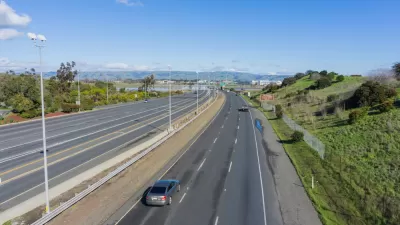The range of cities that have recently removed parking mandates could help motivate others that are eyeing new parking policies.

Michael Andersen looks at new developments in parking reform as it moves, in his words, from the "realm of the radical" to that of "early adopters, the ones who know a good idea when they see it even though it’s off-the-wall."
San Francisco and Minneapolis recently voted down parking mandates for residential developments. While Buffalo, New York, and Harford, Connecticut, took action last year to eliminate minimum parking requirements, Andersen says those cities were motivated by underinvestment and a desire to spur economic activity after the Great Recession.
Meanwhile, San Francisco and Minneapolis are cities with booming economies where the lift on parking mandates will help funnel money into housing development and provide some relief to residents facing affordability challenges.
Andersen believes these changes happening in both larger and smaller cities set a good example for cities across the country:
It proves parking reform is not just a good idea for cities with very different problems, it’s also politically feasible in cities with very different problems. Minneapolis and San Francisco show the way for booming Cascadian cities like Seattle and Richmond. Hartford and Buffalo set examples for flagging ones like Anchorage and Aberdeen.
He hopes the momentum continues and these early milestones will pave the way for other cities considering similar parking reform.
FULL STORY: 2018 WAS THE YEAR PARKING REFORM WENT FROM MINOR TO MAJOR LEAGUE

Alabama: Trump Terminates Settlements for Black Communities Harmed By Raw Sewage
Trump deemed the landmark civil rights agreement “illegal DEI and environmental justice policy.”

Study: Maui’s Plan to Convert Vacation Rentals to Long-Term Housing Could Cause Nearly $1 Billion Economic Loss
The plan would reduce visitor accommodation by 25% resulting in 1,900 jobs lost.

Planetizen Federal Action Tracker
A weekly monitor of how Trump’s orders and actions are impacting planners and planning in America.

Wind Energy on the Rise Despite Federal Policy Reversal
The Trump administration is revoking federal support for renewable energy, but demand for new projects continues unabated.

Passengers Flock to Caltrain After Electrification
The new electric trains are running faster and more reliably, leading to strong ridership growth on the Bay Area rail system.

Texas Churches Rally Behind ‘Yes in God’s Back Yard’ Legislation
Religious leaders want the state to reduce zoning regulations to streamline leasing church-owned land to housing developers.
Urban Design for Planners 1: Software Tools
This six-course series explores essential urban design concepts using open source software and equips planners with the tools they need to participate fully in the urban design process.
Planning for Universal Design
Learn the tools for implementing Universal Design in planning regulations.
Caltrans
Smith Gee Studio
Institute for Housing and Urban Development Studies (IHS)
City of Grandview
Harvard GSD Executive Education
Toledo-Lucas County Plan Commissions
Salt Lake City
NYU Wagner Graduate School of Public Service





























